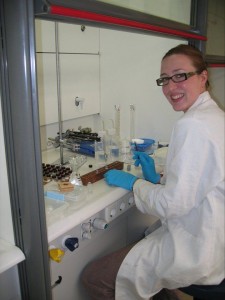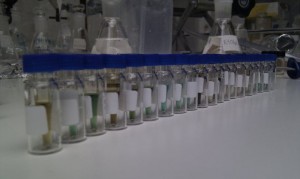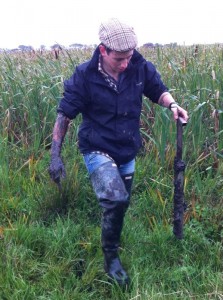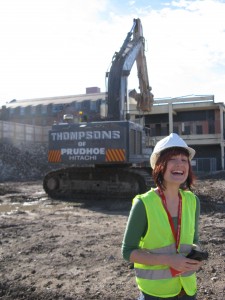Name: Darci Rush
Occupation: Postdoctoral researcher on bacteriohopanepolyols of aerobic methane oxidation
PhD title and year of completion: Ladderanes as tracers for present and past anaerobic ammonium oxidation; 2012.
PhD supervisor: Jaap Sinninghe Damsté and Stefan Schouten
Institution & country: Royal Netherlands Institute for Sea Research (NIOZ), the Netherlands
1) The Twitter challenge: Your PhD in 140 characters
I used diagnostic lipids 2look@ very specific bacteria in the environment. I also found hardier lipids, better suited 2look4 these bacteria in the geological record.
2) What big questions did you tackle in your PhD?
My PhD studies revolved around the question: “Are there lipids which are both specific to bacteria performing anaerobic ammonium oxidation (anammox) AND stable enough to be preserved in marine sediments over long periods of time (during which the lipids are exposed to oxidizing conditions and extreme temperatures and pressures)?”
This was an especially challenging question because the lipids we currently use as tracers for anammox bacteria in present-day settings (ladderane lipids, with concatenated cyclobutane rings) are very labile and are degraded quite quickly. In order to answer my PhD question, I exposed these ladderane lipids to the conditions they would see during sediment burial. Fortunately, I found lots of lipids which were products of the degradation of ladderanes, and I was even able to find some of them back in marine sediments. Like with most PhD projects, the answer to my question brought forth many more questions, but that’s the exciting thing about science.
3) On average how many years does it take to complete a PhD in the Netherlands and how else is the system different from the UK?
In the Dutch system, PhD research last 4 years. The remarkable difference that I have found between the UK and the Netherlands is what I was paid during my PhD. I was considered a “researcher in training” (quite literally the Dutch translation for a PhD student), and therefore my pay reflected that of a young researcher, not a student.
4) So you’re currently a post-doc, what part of post doc-ing do you enjoy the most?
I really enjoy not having the weight of completing my thesis on my shoulders (though I should probably point out another difference about doing a PhD in the Netherlands is that I didn’t have to write a thesis in the same way as it’s usually done in the UK. A Dutch thesis compiles all the papers you’ve written over the course of your research. The thesis itself is also mostly in journal format. The standard for my department was to have more than four papers, with at least one accepted for publication in a peer-reviewed journal, before being about to defend. This might seem like a lot, but we also didn’t have to write up in the same way. The bonus is that all Dutch PhD students walk away with at least one publication under their belt.) Besides that, I like being part of the group project here at Newcastle University. I was the only one working on ladderanes at the NIOZ, which was a bit lonely research-wise at times.
5) What was the most challenging aspect of doing a post doc?
I guess it’s having to now think about where the money will come from next. At the moment, I have two years left on this postdoc, and realistically I should already be thinking of funding.
6) Best travel perk of the job?
During my PhD, I participated on a cruise in the Lau Basin (in the Pacific, between Tonga and Samoa) where we collect hydrothermal vent samples (thousands of meters below the water surface) with a remotely operated vehicle. It wasn’t even for my own research. The postdoc who was going to be working on the samples hadn’t started yet so I got to go in his place. I don’t think I thanked him enough for the vacation I got on Samoa afterwards.
7) Reflecting on your career so far, which publication are you most proud of?
Probably the one that isn’t published yet. The last chapter of my thesis involved pretty much every technique an organic geochemist could ask to use: GC-MS, LC-MS, sample purification, compound specific isotopes, NMR,… What I really enjoyed was combining the different approaches to have an interesting story about thermally stable aliphatic hydrocarbons produced during the hydrous pyrolysis of anammox biomass.
8) Words of wisdom to future post docs
Don’t let a bad science day get you down.




